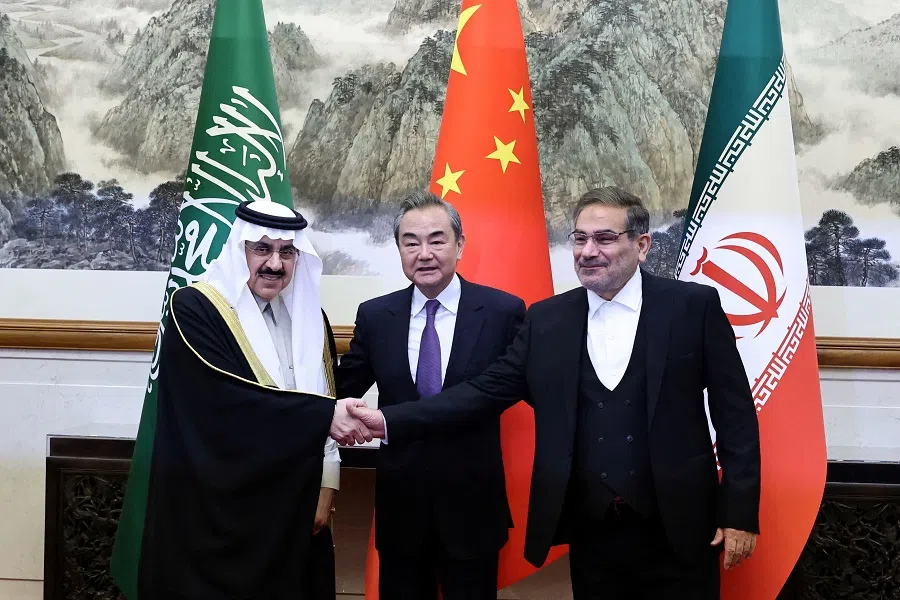Can the US afford a war with China?
The US's propensity for spending more than it has has landed it in a US$31 trillion debt. Furthermore, the US's actions against Russia, Iran, Saudi Arabia and China have weakened US dollar hegemony. US academic Han Dongping remarks that perhaps the US needs to focus on itself before it begins its sabre-rattling over issues such as the Taiwan Strait crisis.

US President Joe Biden recently submitted his US$6.9 trillion budget proposal for the fiscal year 2024 to Congress. The proposal includes running a US$1.8 trillion deficit, which is essentially 35.3% of an estimated US$5.1 trillion government revenue.
The US government has long had the propensity for spending more than it has, which is why it has amassed more than US$31 trillion in debt. But the problem lies in the fact that the country's deficit has doubled from a little over US$1 trillion just a few years ago to nearly US$2 trillion now.
If this trend continues, Republicans estimate that the gross federal debt or the national debt will increase by more than US$10 trillion in the next decade and swell to US$50 trillion.
Poor financial health
As the federal debt increases, it will be increasingly difficult for the US government to borrow. At present, large foreign holders of US debt such as China and Japan are paring back holdings of US Treasuries to protect themselves, worsening the US government's financial crisis as a result.

Throughout history, empires ultimately meet their downfall because of financial crises. France found itself trapped in severe financial difficulties because of the Seven Years' War. While the finance minister repeatedly advised King Louis XVI to proceed with caution and not get involved in the war between the UK and its colony - the US - the French elites could not resist the temptation of "using America to weaken Britain" and gave huge financial support to the American Revolutionary War. This plunged France into a bigger financial crisis and triggered the French Revolution, which sent King Louis XVI to the guillotine.
Little do they know that they are also weakening themselves in the process.
The US is now heavily in debt and should work on easing its financial pressures. But the Biden government cannot resist the temptation of "using Ukraine to weaken Russia" and is deeply embroiled in the Russia-Ukraine conflict, which further worsened the US's financial woe.
American elites are adamant about countering and weakening Russia and China, thinking that they would be safe and secure once their rivals are weakened. Little do they know that they are also weakening themselves in the process.
What America needs now is not to weaken its adversaries but to better strengthen its financial health. Today, numerous problems in the US including deteriorating public facilities, drug abuse, homelessness and issues with food security are left unresolved because of the limited financial resources.
Moving away from USD
The US dollar as a global trade and foreign exchange reserve currency is an important pillar of US global hegemony. Americans are able to rely heavily on borrowing and money printing to keep the US fiscal deficit operating as a result of this important pillar.
To ensure its survival, Russia can only take an alternative approach and bypass the dollar with other BRICS countries such as China to trade in their local currencies.

The US has come down hard on Russia over the Russia-Ukraine war, joining hands with its allies in imposing unprecedentedly severe sanctions on Russia; expelling Russia from the SWIFT banking system; freezing Russia's foreign assets; and cutting off Russia from US dollar transactions, pushing Russia to the brink of collapse.
While these actions have dealt a serious blow to Russia, what the US and its allies don't know is that their sanctions are what the Chinese call "killing a thousand enemy soldiers but losing 800 of your own", an unworthy effort. Western sanctions on Russia have severely damaged the US's credibility, and forced countries such as China, Saudi Arabia, Iran, India and Brazil to prepare for potential sanctions that may be imposed against them in the future.
To ensure its survival, Russia can only take an alternative approach and bypass the dollar with other BRICS countries such as China to trade in their local currencies. As a result, more than 50% of Russia's foreign trade is now settled in RMB and the ruble, as the country moves to slash its US dollar reserves. These things would never have happened if not for US sanctions on Russia.

US sanctions on Iran also forced Iran to move closer to China, leading to the signing of a 25-year cooperation agreement between Iran and China that provides China with heavily discounted Iranian oil paid for in RMB.
China gaining upper hand
Saudi Arabia was once an important US ally in the Middle East, since US dollar hegemony was maintained by Saudi Arabia's petrodollar policy. But after the Russia-Ukraine war broke out, the US asked Saudi Arabia to increase oil production to support the US's effort in weakening Russia. Saudi Arabia refused to do so for the sake of its national interests, and the US immediately threatened to drop its security commitment to the country.
Realising that the US was an unreliable ally, Saudi Arabia accelerated the country's engagement with China. Chinese President Xi Jinping was invited to visit Saudi Arabia, and the two countries signed dozens of agreements during the visit. Saudi Arabia also abandoned its petrodollar policy and allowed China to pay for Saudi's oil exports in RMB, thus weakening the dollar.
The US has always had a strong presence in the Middle East, but China has now clinched the top prize. Although the US appears to be calm about it, it is definitely disappointed.

Under China's mediation, representatives from Saudi Arabia and Iran have recently met in Beijing and agreed to resume diplomatic relations that were cut since 2016. The US has always had a strong presence in the Middle East, but China has now clinched the top prize. Although the US appears to be calm about it, it is definitely disappointed.
This incident also shows China's potential and tells everyone that the US is not totally indispensable to the world. Without the support of the world's largest trading nation that is China, and that of several energy powerhouses, US dollar hegemony will certainly take a big hit.
The US does not need to get involved with everything. It should really mind its own affairs.
In this international climate, although the US government and military have suggested the possibility of going to war with China over Taiwan, the country's financial crisis will in fact limit its ability to conduct large-scale combat operations overseas.
I hope that American elites and the American people will quickly realise that they can in fact choose not to meddle in the Russia-Ukraine war or the Taiwan Strait crisis. The US does not need to get involved with everything. It should really mind its own affairs.
This article was first published in Lianhe Zaobao as "美国将耗不起跟中国的战争".
Related: Saudi-Iran deal: Diplomacy with Chinese characteristics gaining ground | China's entry into the Middle East: Beginning of China-US full-scale confrontation | When Beijing no longer minces its words about the US | US strategists are rethinking the way they see China and Russia | China's strategy to resist the US but bring Europe close



![[Big read] When the Arctic opens, what happens to Singapore?](https://cassette.sphdigital.com.sg/image/thinkchina/da65edebca34645c711c55e83e9877109b3c53847ebb1305573974651df1d13a)
![[Video] George Yeo: America’s deep pain — and why China won’t colonise](https://cassette.sphdigital.com.sg/image/thinkchina/15083e45d96c12390bdea6af2daf19fd9fcd875aa44a0f92796f34e3dad561cc)
